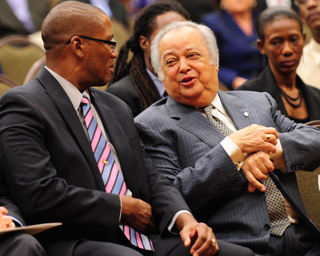(Trinidad Express) Former secretary general of the Commonwealth, Sir Shridath Ramphal QC, is calling on the Government of Trinidad and Tobago to fulfil its obligation to have the Caribbean Court of Justice (CCJ) replace the Privy Council as this country’s final court of appeal.
Ramphal was speaking on Thursday at the launch of the Distinguished Jurist Lecture series of the Trinidad and Tobago Judicial Education Institute, which was held at the Hyatt Regency, Port of Spain.

He said it was at the 19th Caricom Heads of Government meeting in St Lucia in 1998 that then prime minister Basdeo Panday gave an unqualified assurance that Trinidad and Tobago would withdraw its proposal for locating the court here if this country did not fulfil its obligation.
“It was on the strength of that assurance that the location decision was taken,” Ramphal said.
“I like to believe that Trinidad and Tobago, with its long-standing fidelity to legal process, will fulfil its treaty obligations and that issues of location will not arise.
“A constitutional amendment is required for the abolition of appeals to the Privy Council and, in practical terms, that means bipartisan support. In Jamaica and Trinidad and Tobago, it seems that political consensus has not yet been secured although, in Jamaica, inter-party talks are understood to be in progress.”
Ramphal told the audience, which included Chief Justice Ivor Archie and Attorney General Anand Ramlogan, that it is time for the region to put its legal house in order and act in a mature and creative way.
He said the creation of the CCJ has won the admiration of the common law world yet there are countries within the Commonwealth Caribbean which have been slow to acknowledge the CCJ’s jurisdiction in favour of the Privy Council.
Ramphal said the Caribbean has sent judges to several international law tribunals, including the International Court of Justice, the United Nations Tribunal on the Law of the Sea and the International Criminal Court.
“West Indian judges have sat on the Judicial Committee of the Privy Council, but when they sit in Port of Spain they are unacceptable. Why?”
He warned that loss of the CCJ would almost certainly frustrate progress on a Single Market and Economy.
“If West Indian lawyers, in particular, remain complacent about this absurdity much longer, and as we all know some are, we may in the end dismantle even more than the court…
“With the Privy Council no longer a realistic option, the CCJ is the most reliable custodian that West Indians could have of the rule of law in the region….
“The new Supreme Court of Britain would have sturdier and healthier relations with counterpart courts of final jurisdiction in the Commonwealth were some of our countries to stop lingering on the doorstep of colonialism. If we continue to loiter, the interests of law in the Commonwealth will almost certainly require removal of the doorstep.
“Must we wait for such eviction when we have already built for Caribbean law so fine a dwelling here?”





